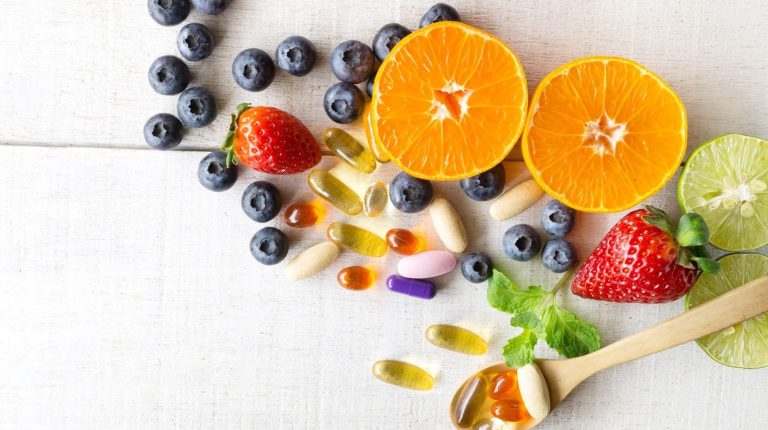Vitamins play an important role in maintaining health and the proper functioning of the entire body. Unfortunately, an improper diet, stress, lack of time to prepare healthy meals, and an increased demand for vitamins at various stages of life mean that many people have difficulty ensuring an adequate supply of these ingredients. Learn how to effectively replenish vitamins in the body and when to consider supplementing them.
A diet rich in vitamins and minerals to support health and well-being
Vitamins and minerals are essential nutrients that support many functions in our body, including the functioning of the immune system, bone health, cognitive functions, and energy metabolism. To ensure their proper levels, we should pay special attention to what appears on our plates. The key in this respect is to maintain a varied diet and eat foods such as fruits, vegetables, whole grain products, nuts, seeds, fish, and lean meat, which are a valuable source of vitamins and minerals.
Regularly providing the body with the right amount of nutrients also affects our mood and energy levels. Vitamins and minerals help reduce stress, affect the quality of sleep and support the functions of the nervous system. As a result, people who take care of a diet rich in these ingredients often feel better and are more resistant to the challenges of everyday life. Importantly, a balanced diet is also an investment in health that brings long-term benefits and supports the overall quality of our lives.
Which vitamins in the diet are the most important?
There is no doubt that the best way to increase the supply of vitamins and minerals is to provide them with your daily diet. It is worth doing this, among others, by choosing high-quality products from reliable suppliers and reaching for low-processed food that contains large amounts of vitamins and minerals. What does it look like in practice?
Vitamin A in the daily diet
Vitamin A plays a very important role in maintaining the health of eyesight, skin, mucous membranes and the good condition of the immune system. Insufficient supply of this ingredient can manifest itself in the deteriorated condition of the skin, hair and nails. To prevent this, it is worth enriching your daily diet, among others, with o:
- vegetables such as carrots, sweet potatoes, pumpkin, spinach and peppers (sources of beta-carotene);
- fruits such as peaches, plums and cherries;
- offal, eggs, butter, oily fish (sources of retinoids).
It is worth remembering that vitamin A is fat-soluble. To increase its absorption in the body, it should be consumed in combination with products containing healthy fats, e.g. add olive oil to a carrot salad or bake sweet potatoes with a little coconut oil.
A diet rich in B vitamins
B vitamins, such as thiamine (B1), riboflavin (B2), niacin (B3), pantothenic acid (B5), pyridoxine (B6), biotin (B7), folic acid (B9) and cobalamin (B12), are essential for the proper functioning of the nervous system, as well as for the health of the skin, hair and nails. Because they are water-soluble, the body does not store them in large quantities, which requires supply with food.
To ensure proper energy levels and digestion, it is worth including B vitamins in your diet, which can be found in:
- whole grain products, including bread, brown rice and oatmeal;
- meat and fish – red meat, pork and fish are a valuable source of vitamin B3, B6 and B12, thus having a beneficial effect on the health of the nervous system;
- dairy products – milk, yoghurts and cheeses are rich in vitamins B2 and B5, which support energy metabolism and skin health;
- legumes – beans, lentils and peas contain folic acid, thiamine and niacin, which are responsible for the proper functioning of the heart and brain;
- green leafy vegetables – broccoli, lettuce, spinach and kale are a source of folic acid, which supports the production of red blood cells and the proper development of the fetus.
Vitamin C in the diet and the protection of cells from oxidative stress
Vitamin C supports the immune system, is involved in the production of collagen and protects cells from the adverse effects of free radicals. Incorporating this ingredient into the daily diet is therefore particularly important for children and adolescents, in order to be able to increase their immunity, i.e. the protection of their young body. The best sources of vitamin C are fresh fruits and vegetables, such as:
- citrus fruits, including oranges, grapefruits, lemons and limes;
- blackcurrant;
- kiwi;
- strawberries;
- red and yellow peppers;
- broccoli;
- sauerkraut.
Also check out what vitamins are worth giving to a school-age child.
A diet rich in vitamin D
Vitamin D, also known as the “sunshine vitamin,” plays an important role in maintaining healthy bones and teeth, as well as the proper functioning of the immune system. Although the human body is able to synthesize this vitamin when exposed to sunlight, in the autumn and winter seasons, exposure to the sun may not be sufficient. For this reason, it is important to also provide vitamin D from food, for example by eating:
- fatty fish, such as mackerel, salmon, tuna and herring;
- fish oils, i.e. cod liver oil;
- eggs;
- liver, especially pork and beef.

A diet rich in vitamins and minerals may sometimes be insufficient to maintain the correct supply of these ingredients in the body. In such a situation, it is worth considering taking appropriately selected dietary supplements that will help supplement the diet. Supplementation is particularly important in cases where:
- we have limited access to certain food products, e.g. due to the diet we follow (vegetarianism, veganism);
- we lead an intensive lifestyle;
- the absorption of nutrients from the diet is insufficient;
- the demand for some vitamins and minerals is increased, e.g. during pregnancy, breastfeeding or in old age.
The decision to supplement should be made after conducting laboratory tests and consulting a doctor or dietician.
Vitamins and minerals in the diet – how to ensure their better absorption?
There is a certain group of factors that can adversely affect the absorption of vitamins and minerals in the body. These include aspects such as:
- long-term exposure to stress – living in constant tension and stress can lead to the loss of important nutrients, such as B vitamins, potassium and magnesium. Also learn: magnesium – properties and role in the body;
- smoking – tobacco adversely affects the mineral balance of calcium and selenium, so smokers should consider increasing the supply of products containing these elements or, if necessary, supplement them;
- alcohol consumption – alcohol can lead to the loss of minerals such as magnesium, calcium, sodium and potassium, as well as disrupt the absorption of B vitamins.
How to supplement vitamins in the body? Summary
To supplement your diet with vitamins, it is worth consuming products rich in vitamins A, C, D and those from group B, such as fruit, vegetables, fish and nuts. Supplementation should be considered when the diet does not provide sufficient amounts of vitamins, especially in the case of special health needs. In case of doubt, it is worth consulting a doctor or dietitian, who will help you develop an appropriate diet and prepare an individual supplementation plan tailored to the needs of a given patient.
Bibliography:
Gawęcki J., Human Nutrition Basics of Nutrition Science, VOLUME 1, PWN Scientific Publishing House, 2018.
Gawęcki J., Healthy and Sick Human Nutrition, VOLUME 2, PWN Scientific Publishing House, 2018.
